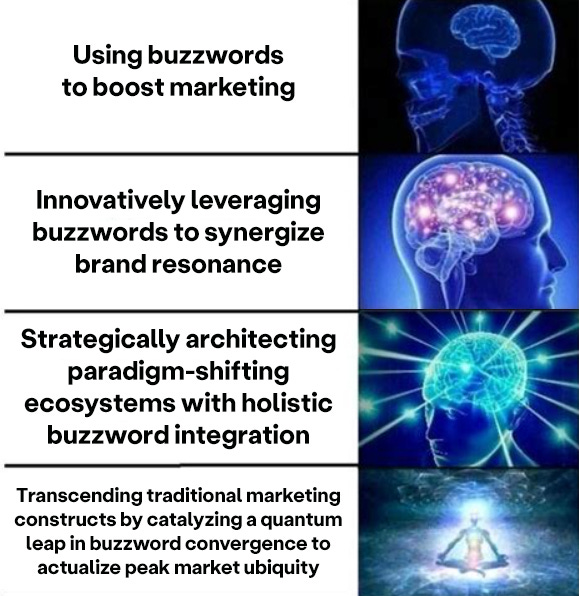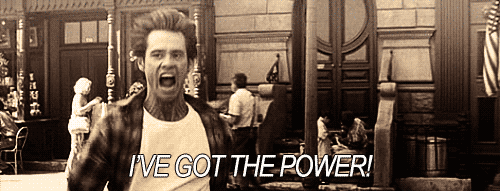Unleashing the Quantum Leap Beyond Buzzword Babylon
And how to cure *almost* every self-inflicted problem with the internet today
"This framework is a game-changing weapon for your vision."
What? A game-changing weapon?
A weapon for my vision?
Does my vision need to be weaponized?
What does that even mean?!?!!
With more than ten years of marketing under my belt, I've encountered my fair share of buzzwords—enough to fill a dictionary, or at least a bingo card. Alas, my ears haven't been spared either; I've been audience to these buzzwords in the wild, up close and personal. Too personal.
There's nothing worse than hearing a copywriter talk the same way they write.
Quantum Leap!
Revolutionary!
Cutting-Edge!
Secret Weapon!
Disruptive!
Trailblazing!
Elite!
Experience the unparalleled, groundbreaking power of our next-gen, revolutionary solution, designed to leverage cutting-edge, state-of-the-art technology for transformational results across all facets of life, setting a new standard in world-class innovation and visionary excellence.
Now yours for the low price of $999.99 (a month)
Marketing hyperbole is something we've all been forced to accept.
Gone are the days when we just used to "Click here" for so-and-so's free ebook, now we're invited to "embark on a journey of discovery and elevate your expertise with our exclusive, pioneering guide."
Buzzwords operate as a linguistic shorthand — or perhaps more accurately, a shortcut — used by marketers to capture attention, convey complex ideas simply, and tap into the zeitgeist.
They're designed to create a vivid image in your mind that suggests a dramatic transformation or improvement. And it works.
Why Marketers Love Buzzwords
Efficiency: Buzzwords pack a lot of punch into a few words, conveying complex concepts quickly.
Emotion: They can generate excitement, fear (of missing out), or a sense of belonging.
Engagement: Buzzwords catch the eye or ear, increasing the chances of grabbing the audience's attention.
Elevation & Rapport: Using buzzwords can make a brand appear up-to-date, knowledgeable, and part of the 'in-crowd'.
Full disclosure, I'm not completely opposed to their usage. I've been known to "unlock" a thing or two in the past.
Unfortunately, they've gotten a little out of hand over the past few years. You must have noticed it too. Here's why:
It's getting harder. Everyone's a marketer. Everyone's doing ads. Everyone has something to sell. The only way to "break through the noise" will inevitably add more noise, to the point that everyone is trying to one-up each other for your attention.
Secondly, with the infusion of AI in, well, everything - every brand is using the same robots, that were trained on the same marketing materials. That's why they're all urging you to "unlock," "unleash," "upend," "revitalize," "mobilize," "synergize," "pivot," "scale" and "elevate."
And finally, TikTok & Co has really done a number on your attention span, and I, as a marketer, know full well that I only have 3 seconds to get you to read, watch, or click. Grasping at straws, or in this case, at buzzwords, is the only chance I have to evoke an emotion and prompt you to take immediate action (rather than providing clear, understandable information.)
It's a vicious cycle.
Using buzzwords should be like seasoning a dish; a little may enhance the flavor, but too much can make it inedible. The key to effective communication, especially in marketing, lies in finding a balance that respects both the message and the audience.
Why You Fall for Them
Desire for simplicity: Buzzwords often promise simple solutions to complex problems.
Social proof: When everyone seems to be talking about something, we're more likely to believe it's important.
Authority bias: Buzzwords, especially when used by perceived experts, gain an aura of credibility.
You fall for marketing buzzwords for the same reason you keep buying gym memberships in January; they promise a transformation that, deep down, you hope can be achieved with more optimism than effort.
You fall for them because they're naturally infused with a sense of revolutionary impact and urgency.
You fall for them because you're human.
Luckily, you can rise above them, both as a marketer and a consumer, by striving for a deeper engagement with the ideas they bring forward.
How to Avoid Falling for Them
Critical thinking: Question what the buzzword actually means and whether it's being used to convey specific information or just to impress.
Research: Look beyond the buzzword for evidence of substance. What are the real-world applications or results?
Education: Familiarize yourself with the most common buzzwords and their cycles of popularity to better recognize when they're being used without substantive backing.
And my absolute favorite solution that can cure almost every self-inflicted problem with the internet today: SLOW SCROLL. Nothing says 'I'm taking control of my digital life' quite like moving through your feed with the speed of a sloth navigating a particularly challenging yoga pose - slow, deliberate, and just a little painful.
Feed your curiosity with intention rather than impulse.
It allows for a deeper engagement with the content you're consuming, and it's guaranteed to reduce the overwhelming flood of information that often leads to superficial understanding and digital fatigue.
Your attention is the online currency.
Reward the use of ethical marketing by viewing, reading, and buying; punish the use of ridiculously cheap marketing by flagging or simply scrolling past. If you're feeling feisty, you can privately email the company (don't comment on their ads or posts, because that's just going to help the algorithm.)
In the words of Snap, you really do have the power.
I was inspired to write this article because I'm currently going through an online course where the founder loves to self-mythologize around his expertise. That's not particularly uncommon. What is uncommon is how it manifests itself - an incessant use of buzzwords.
"This framework is a game-changing weapon for your vision" - is an actual line taken from the course. The 57th buzzword in an hour-long lesson.
I remember hearing it. Pausing the video. Rewinding. Listening to that line again. And bursting out into an incredulous laugh. This is ridiculous. You can turn it off now, I already bought it.
Unfortunately, consumer attention has become both a currency and a casualty.
What do you think?
Do you have any favorite buzzwords?
Let’s hear them…
Was this worth reading?
Use the heart to let me know ❤️






Could hardly agree more, though... you did it yourself here, ironically just above the "Marketing hyperbole..." section:
"There's nothing worse than hearing a copywriter talk the same way they write."
There's so damn much of this snake oil I have very little patience for it. I've muted a few dozen accounts on Substack already for that kind of inflated phrasology, and I've only been here a few weeks.